Experience East Africa, Embrace Transformation
TRAVEL TO KENYA & UGANDA
Social Safari Experience
Experience a unique journey off the beaten path, curated to reveal the beauty and warmth of Kenya and Uganda. Immerse yourself in authentic local experiences, offering a once-in-a-lifetime opportunity to explore the heart of these vibrant cultures.
Internship & Gap Year Programs
Embark on an internship program in Uganda and Kenya, tailored for young people worldwide seeking an authentic African experience while contributing to local communities. Additionally, we offer programs in The Netherlands for our music festivals and events.
Africa Volunteering Programs
A initiative designed to link volunteers globally with organizations in Kenya and Uganda, enabling them to contribute to and engage with impactful grassroots projects.
A STORY BY ONE OF OUR VOLUNTEERS
Volunteering Programs

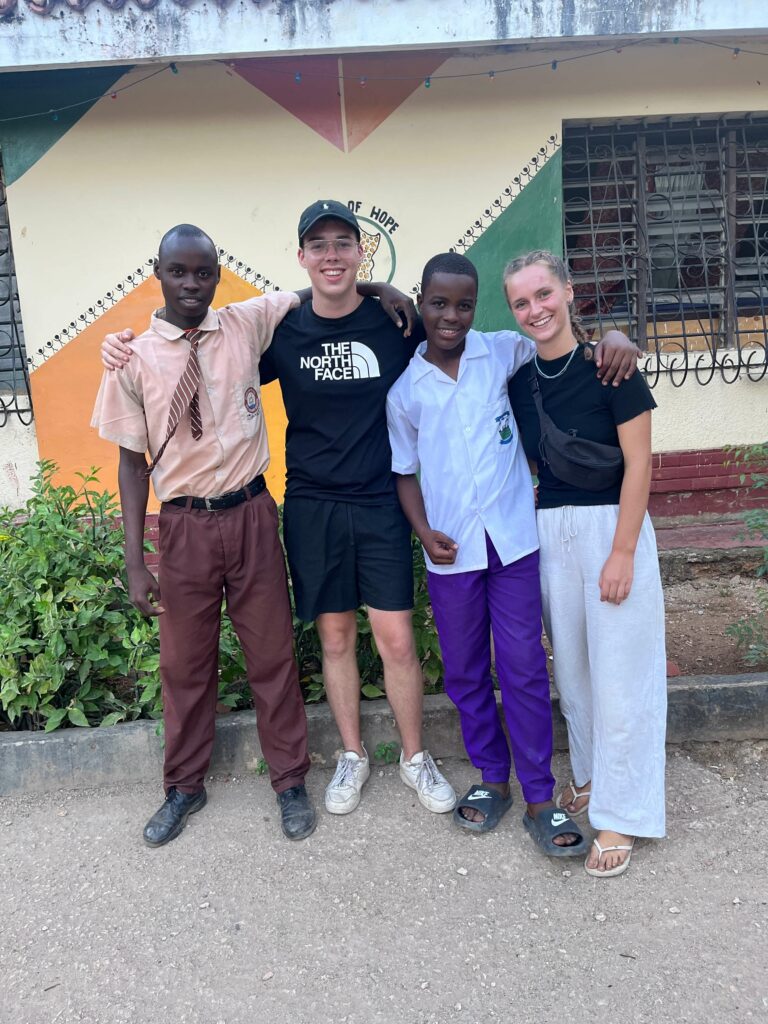
Welcome to our global volunteering program! We’ve created a platform to connect volunteers from around the world with projects that resonate with them. Whether you’re passionate about making a difference in Kenya, Uganda, the Netherlands, or beyond, we have opportunities for you.
In addition to our own projects, we’ve partnered with grassroots organizations, offering even more chances to get involved and make an impact.
At the heart of our program is the belief that collective action is key. We recognize that it takes the combined efforts of volunteers, donors, families, and friends to bring our passion projects to life.
Explore the various volunteering opportunities available and reach out to us if you’re interested. We warmly welcome you to join our community of changemakers!
1. Beats of Hope Children's Home
- Description: Providing a home for street children in Mombasa, Kenya, Beats of Hope Children’s Home (Wana Wa Mola) offers hope and transformational opportunities. Since its inception in 2010, the home has grown to host over 50-100 children, providing essential care, education, and fostering talent through the Beats of Hope Arts Center.
- Volunteer Roles:
- Mentor and train children in various skills.
- Offer guidance and life advice to empower children.
- Organize and participate in recreational activities.
- Assist in educational workshops and tutoring sessions.
- Support administrative tasks and record-keeping.
2. Beats of Hope Arts Center
- Description: The Arts Center in Mombasa nurtures talents in music, dance, and performance arts, providing a platform for youth to explore their creativity. Volunteers play a vital role in supporting artistic development and community engagement.
- Volunteer Roles:
- Mentor and train children in artistic skills.
- Engage in creative activities with children.
- Provide technical support in music recording and production.
- Assist in organizing performances and events.
- Develop outreach programs to involve the community.
3. Beats of Hope Backpackers
- Description: Serving as a social enterprise to fund the Children’s Home, Beats of Hope Backpackers welcomes travelers to experience authentic Mombasa. Volunteers contribute to guest management and enhancing the backpacker experience.
- Volunteer Roles:
- Manage accommodation and hospitality services.
- Host and interact with guests, offering local insights.
- Provide suggestions for improving guest experiences.
- Assist in organizing tours and project visits for guests.
- Contribute to sustainability initiatives at the backpackers.
4. African Safari Festival
- Description: Supporting African music through Akogo Africa, volunteers play a crucial role in mentoring creatives and organizing music festivals. By promoting cultural exchange and global visibility, volunteers help elevate African talent.
- Volunteer Roles:
- Mentor and train artists in music, dance, and arts.
- Assist in festival planning, logistics, and coordination.
- Support marketing and promotion efforts.
- Coordinate artist management and performances.
- Engage in community outreach to promote the festival.
5. Model Agriculture Village - Uganda
- Description: Collaborating with Matunda Hub, Beats of Hope supports rural youth in agribusiness development in Eastern Uganda. Volunteers contribute to capacity building, entrepreneurship training, and community empowerment.
- Volunteer Roles:
- Coach entrepreneurs on business and sustainability.
- Document project activities through media and storytelling.
- Share expertise in agriculture, permaculture, and farming.
- Plan and coordinate educational events and workshops.
- Facilitate networking and collaboration opportunities.
Beats of Hope Women Empowerment - Uganda
- Description: Partnering with Sustain Micro Finance, this project empowers vulnerable women and families through microfinance and vocational skills training. Volunteers support women’s economic empowerment and community development.
- Volunteer Roles:
- Coach women on business and financial literacy.
- Document project impact through storytelling and media.
- Share expertise in various skills relevant to women’s empowerment.
- Plan and coordinate empowerment events and workshops.
- Provide mentorship and support to women entrepreneurs.
Join us in making a difference and fostering positive change in communities. Together, we can empower lives and create sustainable futures.
OUR HAPPY VOLUNTEERS
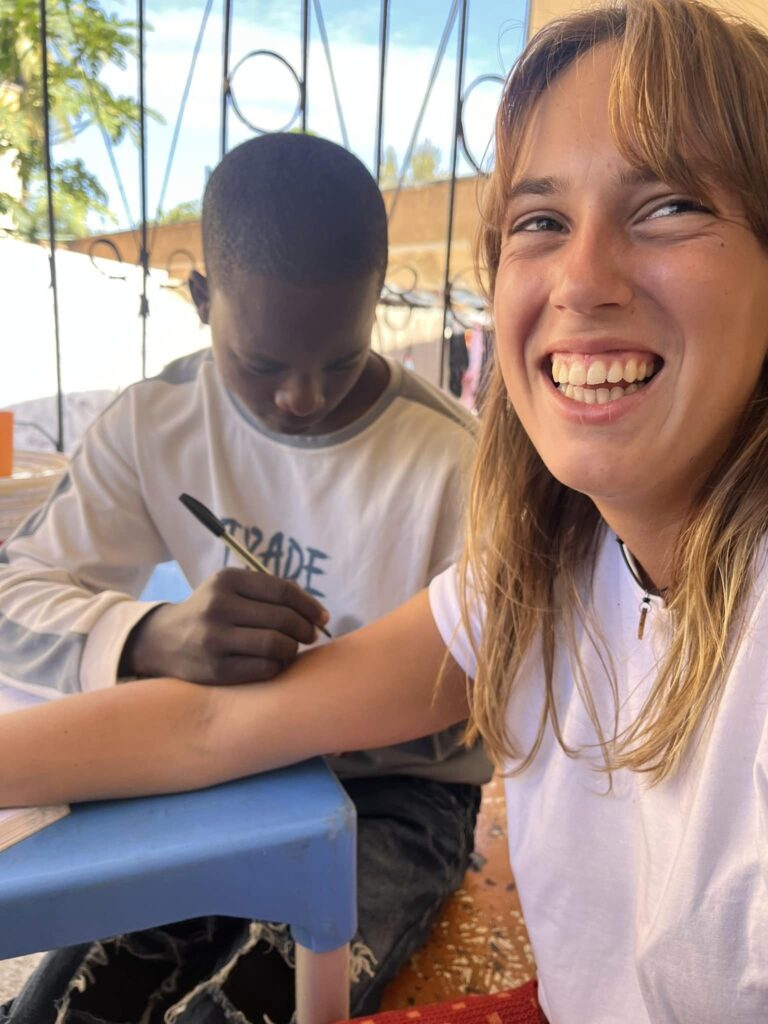

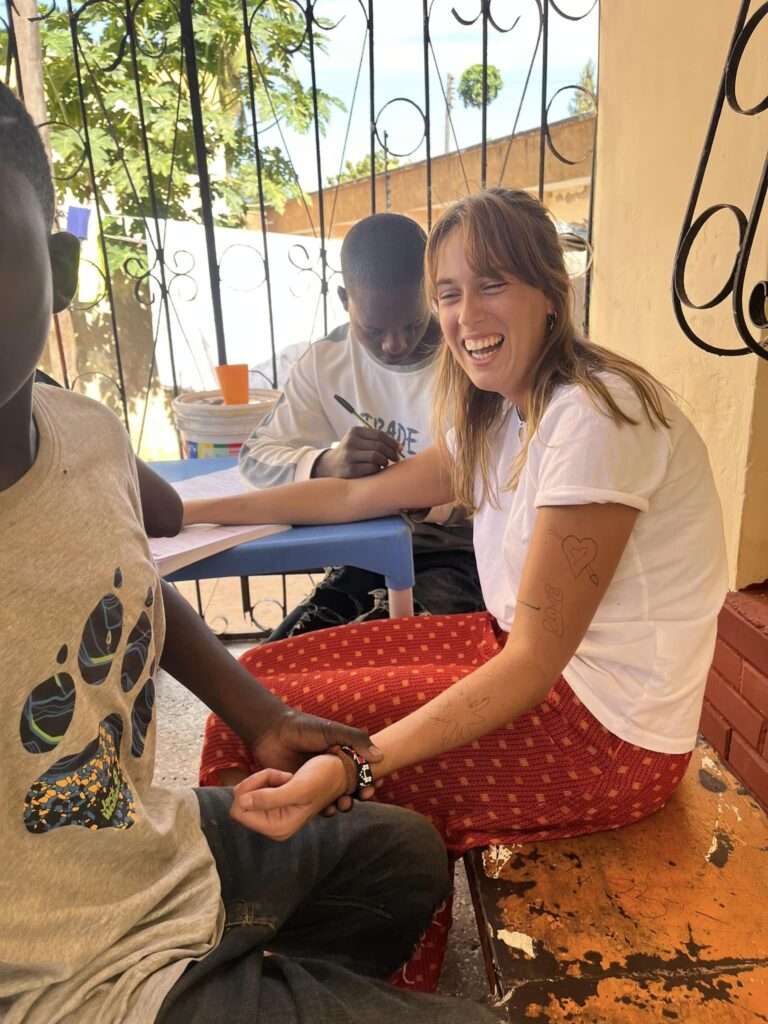






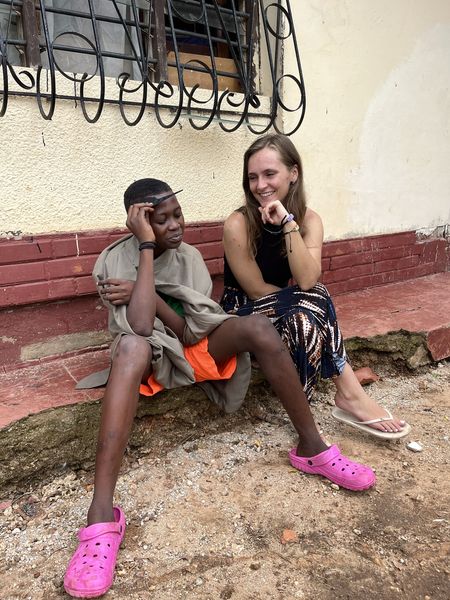



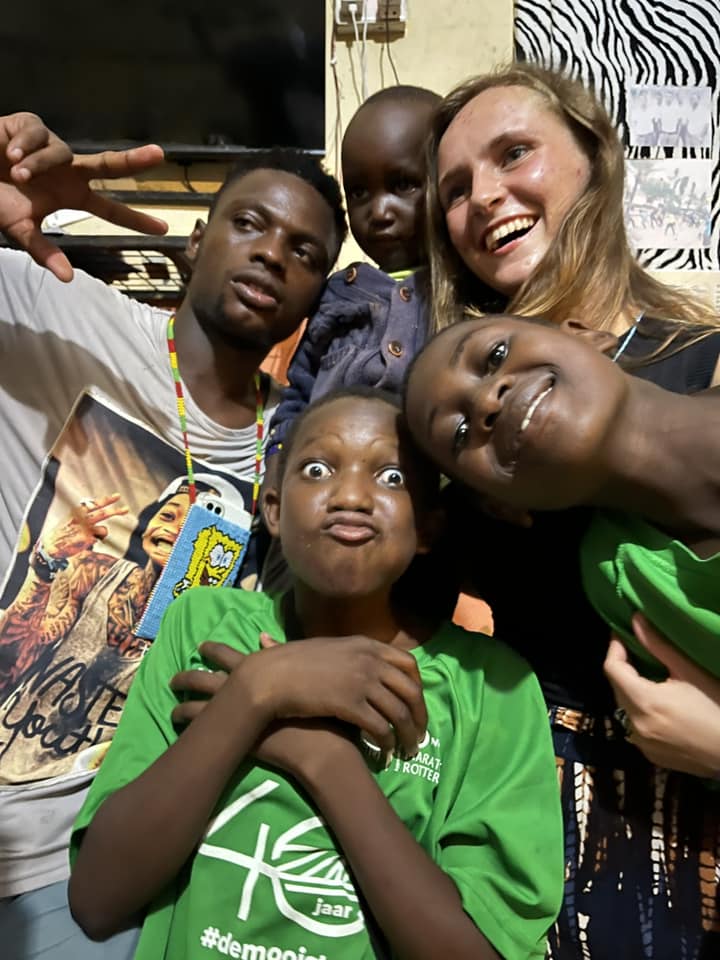
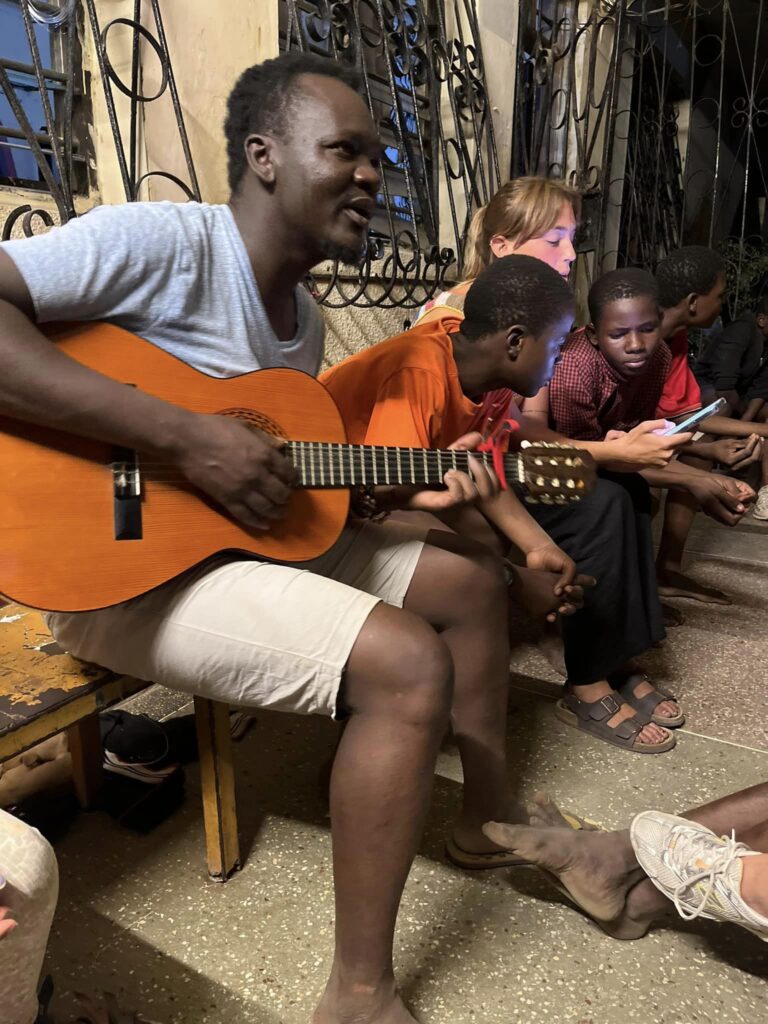
VOLUNTEERS Stories
ELIZE
Before I left for Kenya, I knew very little about the project. I would work with street boys who have been taken care of to ensure a better future.
Now that I have seen Daniel and everything he has created here, I respect what he has done and is doing.
This project is called Wana wa Mola, which means children of God. About 20 boys from 12 years old to somewhere in their 20s live here. Most go to school. Some are waiting to move on to the next school.
I see that they arrange everything around the house themselves. Every boy can cook, do laundry, make a broom, crack coconuts, clean and make beds. They are divided into groups and have varying tasks.
I see older boys walking around there, called mentors, who raised Daniel and want to follow in his footsteps. They have adopted his vision on life, because Daniel works hard to get the boys to adopt the right attitude to life. When some of the older boys start talking, I hear Daniel’s words in their voices. They adopt his way of thinking. Two boys I spoke to indicated that Daniel was a father to them. That’s what I find very special, that they all try to adopt that vision.
In addition, I see that they are raised with a Christian background. They learn who God is and that God is love and loves them. They pray with and for each other. Their own families are not forgotten either. I think it’s wonderful that they are growing up with God.
The mentors are about 23 or a bit older. They have their own talent with which they can do something for Daniel and the project. One manages social media and records everything with the camera. Two others are training to become social workers. There is also a mentor who runs the guesthouse (the Agoko house). Daniel tries to teach them how to support themselves in life.
I see how the boys interact with each other. They are very good to each other. I haven’t seen a fight yet. Occasionally a disagreement, because they have different ideas. But ultimately the way it works here is that you listen to the person above you.
They are also very friendly, caring and respectful to Erika and me. They walk with you when you have to go out on the street and ensure that you are safe. They are also very enthusiastic to teach us things like how to make chapati. They are also curious about what my life is like in the Netherlands. They ask a lot.
There is such a big difference between the behavior of children on the street and these boys. It’s a huge change they’ve gone through.
I did this project together with my friend Erika. It’s so cool to experience this together. Below is what we did during the project:
The first few weeks the boys were on holiday, so there was a lot to do during the day. Daniel wanted to show in the guesthouse at the entrance that the guesthouse is part of the Wana wa Mola (the boys’ residence). That’s why we made a mural in the hallway with two other boys. On the other side we put up a lot of photos with information, such as the vision and mission of the project. The painting turned out so well that we also painted it on the wall in the Wana wa mola.
On April 27 we celebrated King’s Day. This was such a fun day. We played Dutch games. Everyone was enjoying the fun and cheerfulness that this day brought.
When we were there they had a two week holiday. So we could go to the beach with them. Enjoy swimming and having fun.
I also talk to different guys a lot. It’s interesting to hear how life works here. In the first weeks I did not immediately see the poverty. At that time I mainly saw people who were doing quite well, but if you look around more closely, visit other areas of the city and hear stories from the boys, you notice that there is real poverty.
The following two weeks we first helped renovate the restaurant. They want to start this to get jobs for the boys and more income. We repainted. When guests walk in, they immediately see typical Kenyan food on the wall. We also spent more time in the afternoon and evening. First administrative things to create a little more order and then we often went to the boys’ accommodation and were just there to watch them work or chat or help them with something.
I really enjoyed all the varied tasks we did. Sometimes you weren’t doing much and were just relaxing with the boys, other days the day lasted longer. For example, we went to a chicken farm that they have to create extra income. This is a little further outside the city and the nature and way of life there are different than in the city.
What I like and what I really experienced during the project is that there is time for the meeting. There is time to talk about someone’s experiences. We had a number of things we wanted to do every day and I kept thinking: how are we going to do that if we always stop here and chill there for a while. But looking back at the end of a day, we had done more than I thought we could do at the leisurely pace. I’ve learned that faster isn’t always better. I realize that there are people here who really have to work hard and are still barely making ends meet.
It was an educational process to live and work in a different culture!
ANJA
Good morning everyone 🤩!
I would like to share my feelings and experiences from yesterday. It was a very energetic day. Sometimes a bit stressful from the organizational point of view. But we put a lot of effort into organizing this event and we got it back from the practitioners ❤!
There were a lot of children and that brought a lot of happiness and joy to the atmosphere of the festival and made it a family thing in my opinion. I hope we have videos of photos of them, especially that little dance king who danced with Daniel during his performance. That is definitely my best memory of this festival ❤.
The second best memory is when people danced solos to drum music. That was really great. And that is what I personally admire about African culture.
Also: good music, delicious food, interesting workshops (they were all full) and fun disco.
Quite a few people told me that they were satisfied and that they will appear at the next events. 😁 Also parents who were happy that there were so many activities for children.
Guys, I am very happy about this festival. I think we are on the right track.
Thank you very much for your contribution and teamwork. I feel like there are a lot of good festivals ahead of us and great memories to be created. ✨
ERIKA
My name is Erika den Herder. For the past 6 weeks I have been a volunteer with the Beats of Hope organization. Beats of Hope is committed to giving street children a future. They do this by opening a house to about 20 street boys. This allows them to go to school, develop themselves and, when they get older, also take on more responsibility to make ends meet on their own. Daniël, the founder, is their ‘father’ who guides them in this. This project is called ‘Wana wa Mola’ which means children of God. They are therefore also raised with Christian norms and values. In addition to the house, they also have other initiatives, such as a hostel, chicken farm, restaurant and in the Netherlands they organize festivals. So that they are self-sufficient and prepared for a life in society.
Together with my girlfriend, who came after 2 weeks, we carried out all kinds of work for the organization. For example, in consultation with Daniël, I created a new brochure so that the organization is clearly explained to outsiders. In addition to administrative work, we also visited the boys’ chicken farm and got to know the culture and life outside the city. While we were there, the boys had a two-week holiday so we could do fun activities with them during the day. We went to the beach, celebrated King’s Day here and made beautiful murals with the boys. After the holidays the boys went back to school. We then made a mural and came up with a logo for the restaurant, which they plan to open soon.
We as volunteers have been able to perform important and visible tasks for the organization. We also learned a lot from the boys. They loved teaching us things like: ball games, dancing, washing clothes, cleaning, cooking, learning Swahili words and learning to eat new dishes. In addition, they are very curious about the Netherlands, how things are going in our country. Sometimes it almost feels difficult to say how luxurious we have in the Netherlands. Despite this, the boys are not jealous and they learn from Daniel that luxury does not equal happiness. A beautiful life motto that they believe in. They also want to have a stable income for the future before they start a wife/family. A very different approach than most people here in Kenya, where they have fathered children with several women at a young age.
The older boys are given more responsibility and are called ‘mentors’. We consciously look at what talent each boy has and from there each boy is given different responsibilities. Such as running the hostel, being a cook in the restaurant, ensuring safety at the boys’ house or taking photos and videos for the organization’s socials.
I have learned that it is extremely important what kind of environment you grow up in. Daniël teaches these boys good norms and values and they really adopt them. If you really want to change and live a better life, that is really possible. And you don’t need all the luxury stuff that we have in the Netherlands for that. Here they live in a much quieter way, if we don’t finish today, we will continue tomorrow. Stressing is often unnecessary, I have learned here. I loved it and feel honored that I could be part of this organization for a short time. It is vital for street children that such organizations exist.
